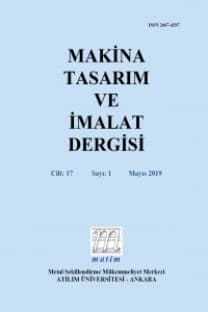15-5 PH Çelik Malzemesinin Kriyojenik Talaşlı İmalat Sürecinde Yüzey Bütünlüğü Analizi
Havacılık ve savunma
sanayilerinde kullanılan birçok parçanın üretiminde talaşlı imalat yöntemi
yaygın olarak kullanılmaktadır. Bu yöntem kullanılarak gerçekleştirilen imalat
süreçlerinde meydana gelen termal ve mekanik etkiler imal edilen malzemelerde
mikroyapısal dönüşümlere sebep olabilmekte olup bu durum nihai ürünün yorulma
ömrü, korozyon direnci ve fonksiyonel performansını etkileyebilmektedir. Bu
çalışmada 15-5 PH çelik malzemesinin kriyojenik talaşlı imalat sürecinin yüzey
bütünlüğü karakteristiklerine etkileri deneysel olarak incelenmiştir. Elde
edilen bulgular kuru ve kesme sıvısı kullanılarak yapılan talaş kaldırmadan
elde edilen bulgularla karşılaştırılmıştır. Düşük kesme hızlarında kriyojenik soğutma
yöntemi ile gerçekleştirilen deneyler neticesinde mikroyapıda plastik deformasyon
ve bunun sonucu olarak mikrosertlik artışı meydana gelmiş, kriyojenik koşullar
altında kesici takımda meydana gelen lokal kırılmalar diğer kesme yöntemlerine
oranla daha pürüzlü bir yüzey oluşumuna neden olmuştur.
Anahtar Kelimeler:
Kriyojenik Talaşlı İmalat, Yüzey Bütünlüğü, Martenzitik Paslanmaz Çelik
___
- 1. Stephenson DA, Agapiou JS. Metal cutting theory and practice: CRC press; 2016.
- 2. Lee C. Phase transformations accompanying low-temperature carburization of martensitic stainless steels under paraequilibrium conditions: Case Western Reserve University; 2012.
- 3. Kumar A, Balaji Y, Prasad NE, Gouda G, Tamilmani K. Indigenous development and airworthiness certification of 15–5 PH precipitation hardenable stainless steel for aircraft applications. Sadhana 2013,38:3-23.
- 4. Garrison W. Ultrahigh-strength steels for aerospace applications. JOM Journal of the Minerals, Metals and Materials Society 1990,42:20-24.
- 5. Mondelin A, Valiorgue F, Rech J, Coret M, Feulvarch E. Modeling of surface dynamic recrystallisation during the finish turning of the 15-5PH steel. Procedia CIRP 2013,8:311-315.
- 6. Mondelin A, Valiorgue F, Coret M, Feulvarch E, Rech J. Surface integrity prediction in finish turning of 15-5PH stainless steel. Procedia Engineering 2011,19:270-275.
- 7. Ganta V, Chakradhar D. Multi objective optimization of hot machining of 15-5PH stainless steel using grey relation analysis. Procedia Materials Science 2014,5:1810-1818.
- 8. Okushima K, Kakino Y. Study on the generating process of machined surface. Bulletin of JSME 1969,12:141-148.
- 9. Chomienne V, Verdu C, Rech J, Valiorgue F. Influence of surface integrity of 15-5PH on the fatigue life. Procedia Engineering 2013,66:274-281.
- 10. Debnath S, Reddy MM, Yi QS. Environmental friendly cutting fluids and cooling techniques in machining: a review. Journal of cleaner production 2014,83:33-47.
- 11. Kaynak Y, Karaca H, Noebe R, Jawahir I. Tool-wear analysis in cryogenic machining of NiTi shape memory alloys: A comparison of tool-wear performance with dry and MQL machining. Wear 2013,306:51-63.
- 12. Kaynak Y, Lu T, Jawahir I. Cryogenic machining-induced surface integrity: a review and comparison with dry, MQL, and flood-cooled machining. Machining science and technology 2014,18:149-198.
- 13. Pereira O, Rodríguez A, Fernández-Abia A, Barreiro J, de Lacalle LL. Cryogenic and minimum quantity lubrication for an eco-efficiency turning of AISI 304. Journal of Cleaner Production 2016,139:440-449.
- 14. Chomienne V, Valiorgue F, Rech J, Verdu C. Influence of Part's Stiffness on Surface Integrity Induced by a Finish Turning Operation of a 15-5PH Stainless Steel. Procedia CIRP 2016,45:19-22.
- 15. Palanisamy D, Senthil P. Machinability Study of Laser Surface Treated 15-5 PH Stainless Steel. Materials and Manufacturing Processes 2016,31:1755-1762.
- 16. Braghini Junior A, Diniz AE, Filho FT. Tool wear and tool life in end milling of 15–5 PH stainless steel under different cooling and lubrication conditions. The International Journal of Advanced Manufacturing Technology 2009,43:756-764.
- 17. Chomienne V, Valiorgue F, Rech J, Verdu C. Influence of ball burnishing on residual stress profile of a 15-5PH stainless steel. CIRP Journal of Manufacturing Science and Technology 2016,13:90-96.
- 18. Machai C, Biermann D. Machining of β-titanium-alloy Ti–10V–2Fe–3Al under cryogenic conditions: Cooling with carbon dioxide snow. Journal of Materials Processing Technology 2011,211:1175-1183.
- 19. Montevecchi F, Grossi N, Takagi H, Scippa A, Sasahara H, Campatelli G. Cutting forces analysis in additive manufactured AISI H13 alloy. Procedia CIRP 2016,46:476-479.
- 20. Holland RA, Kirschvink JL, Doak TG, Wikelski M. Bats use magnetite to detect the earth's magnetic field. PLoS One 2008,3:e1676, 1671-1676.
- 21. Nayak S, Yip K, Ahrens L, Montag C. Calculation of mechanical and thermal stress in the RHIC beam dump windows. In: CA/AP/456 2012 by IEEE–cc Creativ e Commons Attrib ution 3.0 (CC BY 3.0)—cc Creativ e Commons Attrib ution 3.0 (CC BY 3.0); 2012.
- 22. Li J, Umemoto M, Todaka Y, Tsuchiya K. A microstructural investigation of the surface of a drilled hole in carbon steels. Acta Materialia 2007,55:1397-1406.
- 23. Pusavec F, Hamdi H, Kopac J, Jawahir I. Surface integrity in cryogenic machining of nickel based alloy—Inconel 718. Journal of Materials Processing Technology 2011,211:773-783.
- 24. M'Saoubi R, Outeiro J, Chandrasekaran H, Dillon Jr O, Jawahir I. A review of surface integrity in machining and its impact on functional performance and life of machined products. International Journal of Sustainable Manufacturing 2008,1:203-236.
- 25. Jawahir I, Pu Z, Yang S, Rotella G, Kaynak Y, Lu T, et al. Cryogenic processing of materials for enhanced product life, performance and sustainability. In: Proc. of 15th International Conference on Advances in Materials and Processing Technologies, Wollongong, Australia; 2012.
- 26. Ulutan D, Ozel T. Machining induced surface integrity in titanium and nickel alloys: A review. International Journal of Machine Tools and Manufacture 2011,51:250-280.
- 27. Groover MP. Fundamentals of modern manufacturing: materials processes, and systems: John Wiley & Sons; 2007.
- ISSN: 1302-9487
- Başlangıç: 1986
- Yayıncı: Makina Tasarım ve İmalat Derneği
Sayıdaki Diğer Makaleler
Endüstri 4.0: Üretimde Kavram ve Algı Devrimi
15-5 PH Çelik Malzemesinin Kriyojenik Talaşlı İmalat Sürecinde Yüzey Bütünlüğü Analizi
Bir İmalat Sisteminde Darboğaz Modeli ile Üretim Kapasitesinin Artırılması
Yusuf Tansel İÇ, Mustafa YURDAKUL, Barış KEÇECİ, Öykü TOKMAK, Gizem Gül KOÇ, Gamze BUYRUK
Hasan DEMİRTAŞ, Oğuzhan YILMAZ, Bahattin KAMBER
Katmanlı İmalatla Üretilen Ti6Al4V Parçalarının Mekanik Özellikleri
